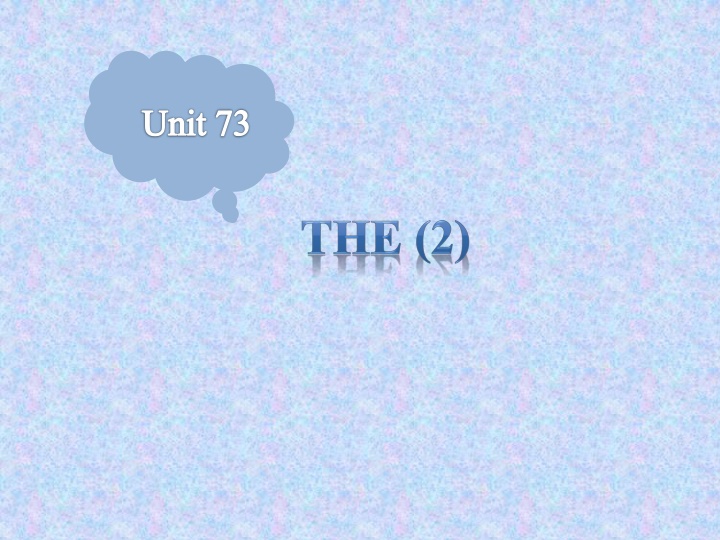
Usage of 'The' in English Grammar Explained with Examples
Understanding when to use 'the' in English grammar is essential for proper communication. This article explains when to use 'the' with singular countable nouns, adjectives, nationalities, and specific expressions. Examples are provided to illustrate each case, such as using 'the' with adjectives like 'rich' and 'old' when referring to a group of people. Additionally, guidelines for using 'the' with nationality words are outlined, including when to use 'the' with nationalities ending in '-ese' or requiring a plural noun.
Download Presentation

Please find below an Image/Link to download the presentation.
The content on the website is provided AS IS for your information and personal use only. It may not be sold, licensed, or shared on other websites without obtaining consent from the author. If you encounter any issues during the download, it is possible that the publisher has removed the file from their server.
You are allowed to download the files provided on this website for personal or commercial use, subject to the condition that they are used lawfully. All files are the property of their respective owners.
The content on the website is provided AS IS for your information and personal use only. It may not be sold, licensed, or shared on other websites without obtaining consent from the author.
E N D
Presentation Transcript
Note that you can also use a plural noun without the: - Roses are my favourite flowers. ( but not the roses ) * We also use the + a singular countable noun when we talk about type of machine, an invention etc. For example: - when was the telephone invented ? - The bicycle is an excellent means of transport. * We also use the for musical instruments: - Can you play the guitar ? ( not Can you play guitar ? ) - The piano is my favourite instrument.
We use the with some adjectives ( without a noun ). The meaning is always plural. For example: - Do you think the rich should pay more taxes ?
We use the especially with these adjective: the rich the old the blind the sick the disabled the injured the poor the young
the deaf the dead The unemployed -That man over there is collecting money for the blind. -Why does not the government do more to help the unemployed ? These expressions are always plural. You cannot say a blind or an unemployed . You have to say a blind man , an unemployed woman etc.
You can use the with some nationality adjective when you mean the people Of that country . For example: -The French are famous for their food. (= the French people) -Why do the English think they are so wonderful? (= the English people) You can say the in this way with these nationality words; the British the Welsh the Spanish the Dutch The English the Irish the French the Swiss
-Also with nationality words ending in ese ( the Japanese / the Chinese ) - With other nationalities you have to use a plural noun ending in s: (the) Russians (the) Italians (the) Arabs (the) Scots (the) Turks
